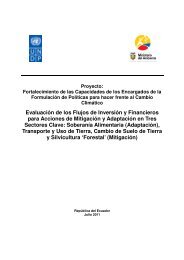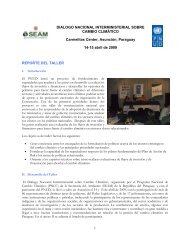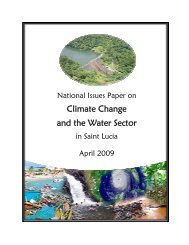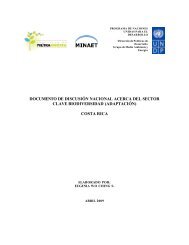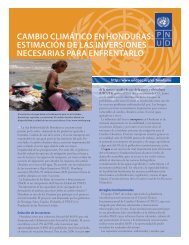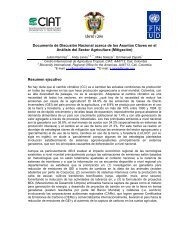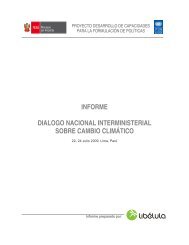View Publication - UNDPCC.org
View Publication - UNDPCC.org
View Publication - UNDPCC.org
You also want an ePaper? Increase the reach of your titles
YUMPU automatically turns print PDFs into web optimized ePapers that Google loves.
viii<br />
Cannady — Access to Climate Change Technology by Developing Countries: A Practical Strategy<br />
Executive Summary<br />
Climate change presents a momentous challenge for developing countries. 2 Water scarcity in arid<br />
regions, island inundation, bacterial contamination and immunity deficit, food shortages, expensive<br />
energy and infrastructure collapse due to energy shortages are all foreseeable crises with catastrophic<br />
consequences for poor people. Developing countries need to employ climate change technologies in<br />
order to avert climate catastrophe.<br />
This paper critically examines various approaches that have been suggested for facilitating access<br />
to climate change technology by developing countries, including compulsory licensing, patent pools,<br />
patent databases and structured voluntary licensing “mechanisms”. These are non-solutions, or at<br />
best partial solutions, because they would not deliver adequate results. Most of these approaches<br />
are based on an outmoded model of patronizing relationships between technology owners (developed<br />
country parties) and passive recipients of technology transfer (developing country parties).<br />
In this regard, some of the suggested approaches could potentially be detrimental to developing<br />
countries. For example, in some cases patent pools may cover patents not legally valid in many<br />
developing countries, while requiring developing countries to contribute their own intellectual<br />
capital and/or pay royalties for the use of patents that they otherwise would not be legally required<br />
to pay. Patent information databases are compilations of public material that is already accessible<br />
to developing countries, while diverting funding opportunities to lucrative information technology<br />
(IT) contracts (to change the search parameters or <strong>org</strong>anization of the data) to developed nation<br />
enterprises and experts. Proposals for structured voluntary licensing mechanisms entail royalties,<br />
and they place too much reliance on management by developed country professionals, international<br />
bureaucratic arrangements (of what must be an agile business process), expensive software, and<br />
packaged technology portfolios selected by developed country parties. Most damaging, non-solutions<br />
divert finite resources from effective solutions.<br />
This paper proposes a two-pronged strategy for developing countries to gain access to climate change<br />
technology, while f<strong>org</strong>ing a pathway for national and regional development. The first prong is a climate<br />
change technology innovation strategy (CCTIS). Developing countries should target climate change<br />
research in their universities and research institutions, strengthen innovation infrastructure to support<br />
their researchers, claim the economic value of their human capital as intellectual property (IP), and<br />
participate as owners in the growing global market for climate change technology. An innovation<br />
strategy should target the funding and infrastructure deficit that cripples research, development<br />
and commercialization by developing country actors in developing countries. International funding<br />
initiatives should support developing country-originated CCTIS.<br />
CCTIS is the foundation for the second prong of this approach: mutually beneficial technology<br />
transfer 3 contracts. Such contracts, generally technology licences and development collaboration<br />
agreements, should be “win–win” contracts, balanced in benefit to both parties. Without the support<br />
of a realized innovation strategy, attempting to negotiate beneficial technology transfer agreements<br />
is like constructing a building without a foundation.<br />
Climate change technology development will benefit developing nations directly by providing useful<br />
technologies, and bargaining power in negotiation of licensing and collaboration agreements, but<br />
also indirectly by providing jobs and other spillover effects. Regional research and development<br />
(R&D) networks will extend opportunities to least developed countries (LDCs). This paper describes<br />
precedents for this strategy in China and Cuba.







